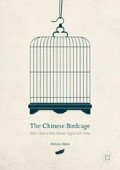Abstract
Under the leadership of Deng Xiaoping, China in 1978 started to open up to the outside world. It did so without abandoning the centrally planned economy, gradually introducing market elements instead. According to Zhao Ziyang, who was premier under Deng Xiaoping and was banned from public life after 1989 for being too sympathetic to the students in Tiananmen Square, the Chinese leadership envisioned a birdcage economy in which the centrally planned economy was the cage and the birds were the market economy. The three key elements that contributed to the success of China’s economic transformation are gradualism, decentralism, and experimentation. Given the dismal state of China’s economy after Mao’s ruinous reign, there was widespread support among the elite for economic reforms.
Access this chapter
Tax calculation will be finalised at checkout
Purchases are for personal use only
Notes
- 1.
GDP per capita in 1980 measured in Purchasing Power Parity (PPP), International Monetary Fund .
- 2.
Orville Schell , To Get Rich Is Glorious, Pantheon Books, New York, 1984.
- 3.
It seems that Deng Xiaoping never actually said “To get rich is glorious,” although Wallace’s questions suggest that he did and Deng doesn’t deny it.
- 4.
Schell (1984).
- 5.
Loren Brandt and Thomas G. Rawski , “China’s Great Transformation,” in Brandt , Loren; Rawski , G. Thomas, China’s Great Transformation, Cambridge University Press, 2008.
- 6.
Brandt and Rawski (2008).
- 7.
Schell (1984).
- 8.
Deng officially retired in 1992 but he remained China’s preeminent leader until his death in February 1997.
- 9.
“How Deng Xiaoping Helped Create a Corrupt China,” The New York Times , June 3, 2015.
- 10.
Gan, J., (2009), “Privatization in China: Experiences and Lessons,” China’s Emerging Financial Markets: Challenges and Opportunities (J. Barth, J. Tatom, and G. Yago, 2008 eds.), The Milken Institute Series on Financial Innovation and Economic Growth.
- 11.
Sarah Tong & Huang Yanjie, China’s State-owned Enterprises in the Post-Crisis Era: Development and Dilemma, 694 EAI Background Brief 7, National University of Singapore, 2012.
- 12.
“Capitalism confined,” The Economist, September 3, 2011.
- 13.
“China cautiously embraces privatization of state-owned enterprises,” The Financial Times, September 25, 2015.
- 14.
GDP per capita measured in PPP, International Monetary Fund .
- 15.
Joseph Stiglitz , Globalization and Its Discontents, Penguin, 2003.
- 16.
Susan L. Shirk , The Political Logic of Economic Reform in China, University of California, Berkeley, 1993.
- 17.
Brandt and Rawski (2008).
- 18.
Poverty & Equity Databank, World Bank .
- 19.
Id.
- 20.
Shirk (1993).
- 21.
Id.
- 22.
Brandt and Rawski (2008).
Author information
Authors and Affiliations
Copyright information
© 2016 The Author(s)
About this chapter
Cite this chapter
Mees, H. (2016). The Chinese Birdcage. In: The Chinese Birdcage. Palgrave Macmillan, New York. https://doi.org/10.1057/978-1-137-58886-9_1
Download citation
DOI: https://doi.org/10.1057/978-1-137-58886-9_1
Published:
Publisher Name: Palgrave Macmillan, New York
Print ISBN: 978-1-137-58888-3
Online ISBN: 978-1-137-58886-9
eBook Packages: Economics and FinanceEconomics and Finance (R0)

